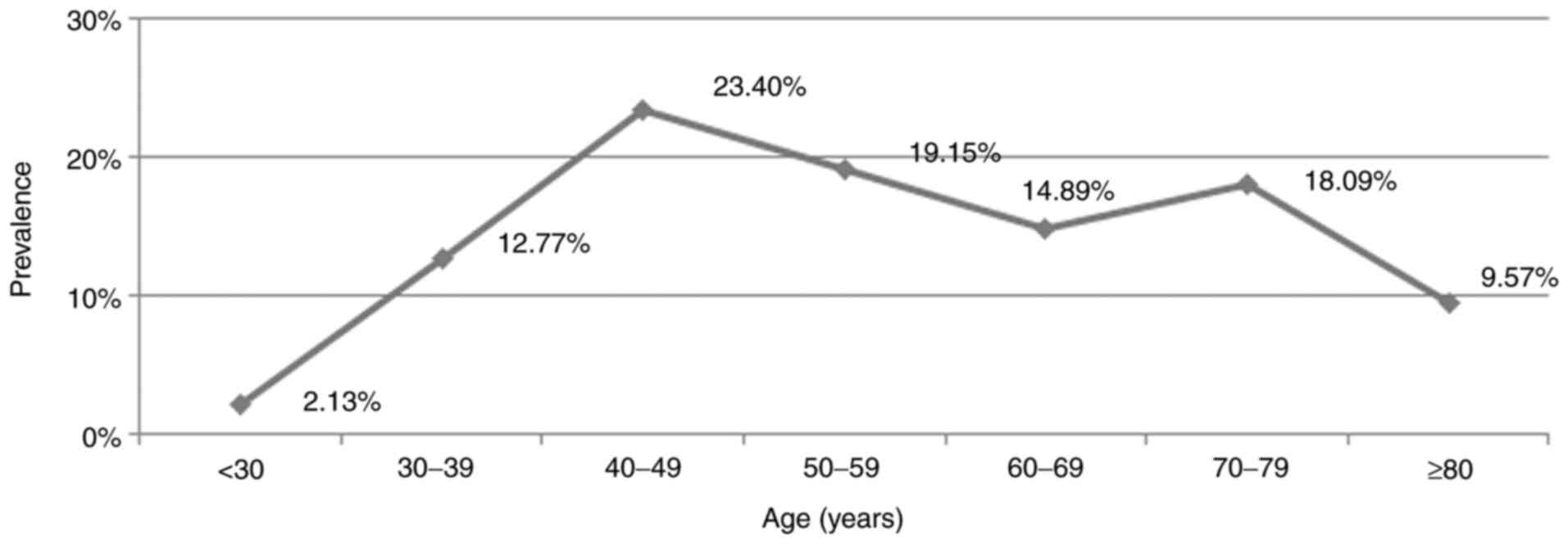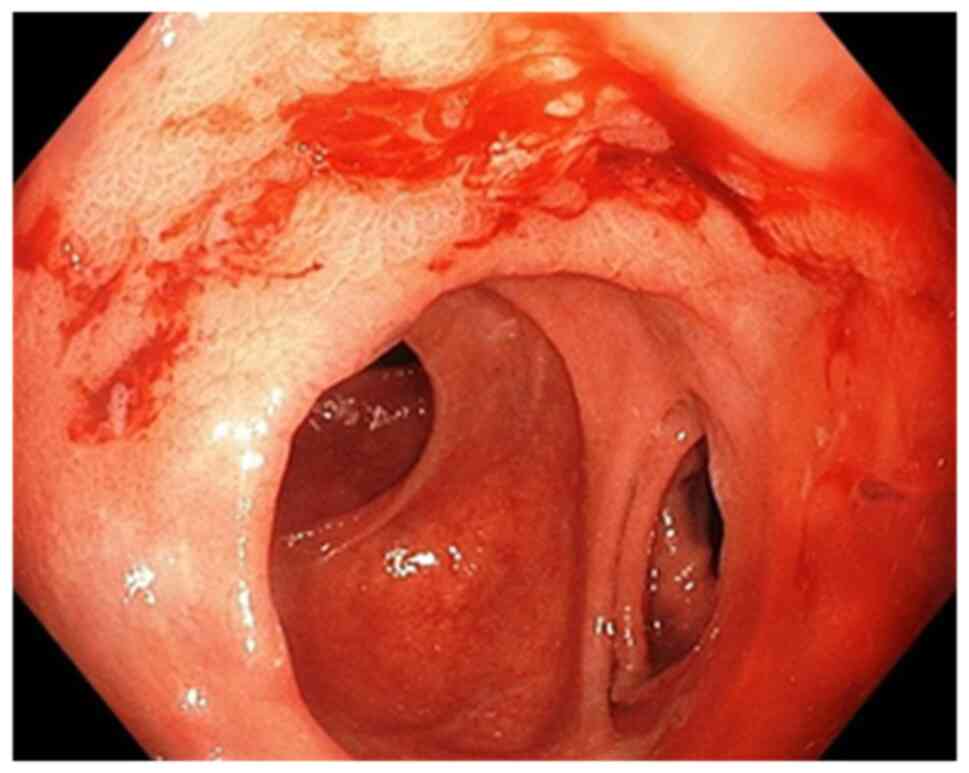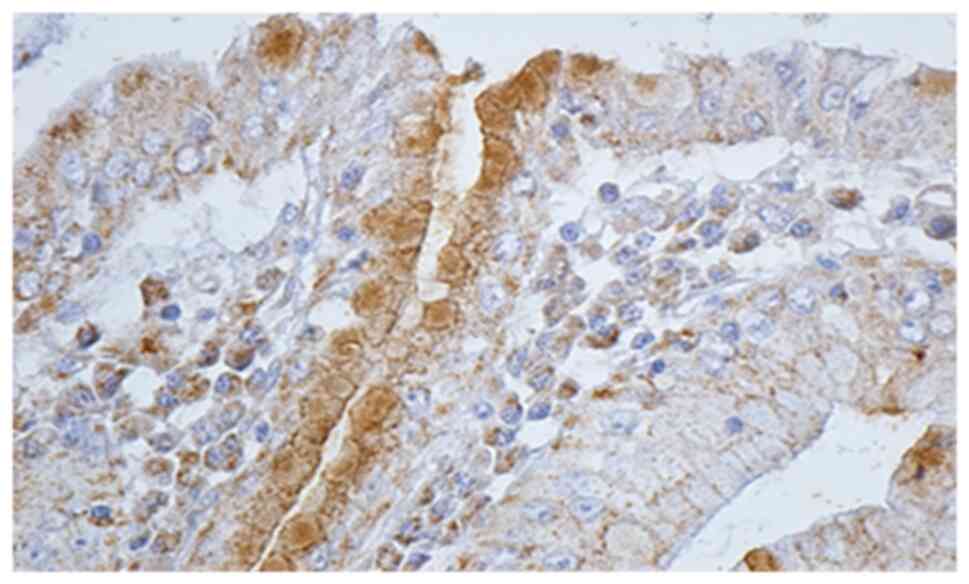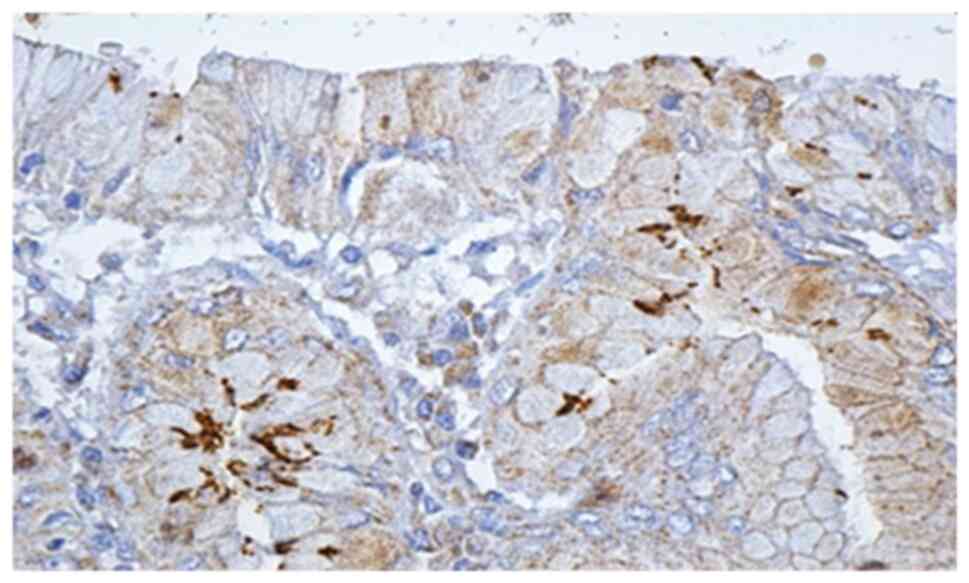|
1
|
Obleagă CV, Vere CC, Vîlcea ID, Ciorbagiu
MC, Moraru E and Mirea CS: Helicobacter pylori: Types of
diseases, diagnosis, treatment and causes of therapeutic failure. J
Mind Med Sci. 3:156–161. 2016.
|
|
2
|
Kuipers EJ, Thijs JC and Festen HP: The
prevalence of Helicobacter pylori in peptic ulcer disease.
Aliment Pharmacol Ther. 9 (Suppl 20):S59–S69. 1995.PubMed/NCBI
|
|
3
|
Hentschell E, Brandstätter G, Dragosics B,
Hirschl AM, Nemec H, Schütze K, Taufer M and Wurzer H: Effect of
ranitidine and amoxycillin plus metronidazole on the eradication of
Helicobacter pylori and the recurrence of duodenal ulcer. N
Engl J Med. 328:308–312. 1993.PubMed/NCBI View Article : Google Scholar
|
|
4
|
Gisbert JP, Khorrami S, Carballo F, Calvet
X, Gene E and Dominguez-Munoz E: Meta-analysis: Helicobacter
pylori eradication therapy vs. antisecretory non-eradication
therapy for the prevention of recurrent bleeding from peptic ulcer.
Aliment Pharmacol Ther. 19:617–629. 2004.PubMed/NCBI View Article : Google Scholar
|
|
5
|
Guo CG, Cheung KS, Zhang F, Chan EW, Chen
L, Wong ICK and Leung WK: Delay in retreatment of Helicobacter
pylori infection increases risk of upper gastrointestinal
bleeding. Clin Gastroenterol Hepatol. 19:314–322.e2.
2021.PubMed/NCBI View Article : Google Scholar
|
|
6
|
Gisbert JP and Abraira V: Accuracy of
Helicobacter pylori diagnostic tests in patients with
bleeding peptic ulcer: A systematic review and meta-analysis. Am J
Gastroenterol. 101:848–863. 2006.PubMed/NCBI View Article : Google Scholar
|
|
7
|
Stolte M and Meining A: The updated Sydney
system: Classification and grading of gastritis as the basis of
diagnosis and treatment. Can J Gastroenterol. 15:591–598.
2001.PubMed/NCBI View Article : Google Scholar
|
|
8
|
Mao T, Wang Y, Yin F, Zhao Q, Yang L, Ding
X and Tian Z: Association of endoscopic features of gastric mucosa
with Helicobacter pylori infection in Chinese patients.
Gastroenterol Res Pract. 2016(6539639)2016.PubMed/NCBI View Article : Google Scholar
|
|
9
|
Slăvescu KC, Șarban C, Pîrvan A, Gheban D,
Mărgescu C and Miu N: Prevalence of Helicobacter pylori
infection in children with gastritis and peptic ulcer disease in
north-western and central Romania. Med Pharmacy Rep. 85:457–462.
2012.
|
|
10
|
Megraud F: H. pylori antibiotic
resistance: Prevalence, importance and advances in testing. Gut.
53:1374–1384. 2004.PubMed/NCBI View Article : Google Scholar
|
|
11
|
Park S and Chun HJ: Helicobacter
pylori infection following partial gastrectomy for gastric
cancer. World J Gastroenterol. 20:2765–2770. 2014.PubMed/NCBI View Article : Google Scholar
|
|
12
|
Testerman TL and Morris J: Beyond the
stomach: An updated view of Helicobacter pylori
pathogenesis, diagnosis, and treatment. World J Gastroenterol.
20:12781–12808. 2014.PubMed/NCBI View Article : Google Scholar
|
|
13
|
Wroblewski LE, Peek RM Jr and Wilson KT:
Helicobacter pylori and gastric cancer: Factors that
modulate disease risk. Clin Microbiol Rev. 23:713–739.
2010.PubMed/NCBI View Article : Google Scholar
|
|
14
|
Conteduca V, Sansonno D, Lauletta G, Russi
S, Ingravallo G and Dammacco F: H. pylori infection and
gastric cancer: State of the art (Review). Int J Oncol. 42:5–18.
2013.PubMed/NCBI View Article : Google Scholar
|
|
15
|
Alberto P and Franceschi M:
Helicobacter pylori infection in older people. World J
Gastroenterol. 20:6364–6373. 2014.PubMed/NCBI View Article : Google Scholar
|
|
16
|
Constantin VD, Paun S, Ciofoaia VV, Budu V
and Socea B: Multimodal management of upper gastrointestinal
bleeding caused by stress gastropathy. J Gastrointestin Liver Dis.
18:279–284. 2009.PubMed/NCBI
|
|
17
|
Pilotto A: Aging and upper
gastrointestinal disorders. Best Pract Res Clin Gastroenterol. 18
(Suppl):S73–S81. 2004.PubMed/NCBI View Article : Google Scholar
|
|
18
|
Venerito M, Schneider C, Costanzo R, Breja
R, Röhl FW and Malfertheiner P: Contribution of Helicobacter
pylori infection to the risk of peptic ulcer bleeding in
patients on nonsteroidal anti-inflammatory drugs, antiplatelet
agents, anticoagulants, corticosteroids and selective serotonin
reuptake inhibitors. Aliment Pharmacol Ther. 47:1464–1471.
2018.PubMed/NCBI View Article : Google Scholar
|
|
19
|
Pilotto A and Franceschi M:
Helicobacter pylori infection in older people. World J
Gastroenterol. 20:6364–6373. 2014.PubMed/NCBI View Article : Google Scholar
|
|
20
|
Lanas A, Dumonceau JM, Hunt RH, Fujishiro
M, Scheiman JM, Gralnek IM, Campbell HE, Rostom A, Villanueva C and
Sung JJY: Non-variceal upper gastrointestinal bleeding. Nat Rev Dis
Primers. 4(18020)2018.PubMed/NCBI View Article : Google Scholar
|
|
21
|
Pilotto A, Franceschi M, Leandro G, Paris
F, Cascavilla L, Longo MG, Niro V, Andriulli A, Scarcelli C and Di
Mario F: Proton-pump inhibitors reduce the risk of uncomplicated
peptic ulcer in elderly either acute or chronic users of
aspirin/non-steroidal anti-inflammatory drugs. Aliment Pharmacol
Ther. 20:1091–1097. 2004.PubMed/NCBI View Article : Google Scholar
|
|
22
|
Narayanan M, Reddy KM and Marsicano E:
Peptic ulcer disease and Helicobacter pylori infection. Mo
Med. 115:219–224. 2018.PubMed/NCBI
|
|
23
|
Zapata-Colindres JC, Zepeda-Gómez S,
Montaño-Loza A, Vázquez-Ballesteros E, De Jesús Villalobos J and
Valdovinos-Andraca F: The association of Helicobacter pylori
infection and nonsteroidal anti-inflammatory drugs in peptic ulcer
disease. Can J Gastroenterol. 20:277–280. 2006.PubMed/NCBI View Article : Google Scholar
|
|
24
|
Zhang L, Eslick GD, Xia HH, Wu C, Phung N
and Talley NJ: Relationship between alcohol consumption and active
Helicobacter pylori infection. Alcohol Alcohol. 45:89–94.
2010.PubMed/NCBI View Article : Google Scholar
|
|
25
|
Hosseininasab Nodoushan SA and Nabavi A:
The interaction of Helicobacter pylori infection and type 2
diabetes mellitus. Adv Biomed Res. 8(15)2019.PubMed/NCBI View Article : Google Scholar
|
|
26
|
He C, Yang Z and Lu NH: Helicobacter
pylori infection and diabetes: Is it a myth or fact? World J
Gastroenterol. 20:4607–4617. 2018.PubMed/NCBI View Article : Google Scholar
|
|
27
|
Suceveanu AI, Stoian AP, Parepa I, Voinea
C, Hainarosie R, Manuc D, Nitipir C, Mazilu L and Suceveanu AP: Gut
microbiota patterns in obese and type 2 diabetes (T2D) patients
from romanian black sea coast region. Rev Chim. 69:2260–2267.
2018.
|
|
28
|
Okushin K, Tsutsumi T, Ikeuchi K, Kado A,
Enooku K, Fujinaga H, Moriya K, Yotsuyanagi H and Koike K:
Helicobacter pylori infection and liver diseases:
Epidemiology and insights into pathogenesis. World J Gastroenterol.
24:3617–3625. 2018.PubMed/NCBI View Article : Google Scholar
|
|
29
|
Tsai CE, Liang CM, Lee CH, Kuo YH, Wu KL,
Chiu YC, Tai WC and Chuah SK: First-line Helicobacter pylori
eradication among patients with chronic liver diseases in Taiwan.
Kaohsiung J Med Sci. 32:397–402. 2016.PubMed/NCBI View Article : Google Scholar
|
|
30
|
Gheorghe G, Stoian AP, Gaman M, Socea B,
Neagu TP, Stanescu AMA, Bratu OG, Mischianu DLD, Suceveanu AI and
Diaconu CC: The Benefits and Risks of Antioxidant Treatment in
Liver Diseases. Rev Chim. 70(651)2019.
|
|
31
|
Huan JQ, Sridhar S and Hunt RH: Role of
Helicobacter pylori infection and nonsteroidal
anti-inflammatory drugs in peptic-ulcer disease: A meta-analysis.
Lancet. 359:14–22. 2002.PubMed/NCBI View Article : Google Scholar
|
|
32
|
Braden B: Diagnosis of Helicobacter
pylori infection. BMJ. 344(828)2012.PubMed/NCBI View Article : Google Scholar
|
|
33
|
Lee JY and Kim N: Diagnosis of
Helicobacter pylori by invasive test: Histology. Ann Transl
Med. 3(10)2015.PubMed/NCBI View Article : Google Scholar
|
|
34
|
Alius C, Tudor C, Badiu CD, Dascalu AM,
Smarandache CG, Sabau AD, Tanasescu C, Balasescu SA and Serban D:
Indocyanine green-enhanced colorectal surgery-between being
superfluous and being a game-changer. Diagnostics (Basel).
10(742)2020.PubMed/NCBI View Article : Google Scholar
|
|
35
|
Kokkola A, Rautelin H, Puolakkainen P,
Sipponen P, Färkkilä M, Haapiainen R and Kosunen TU: Diagnosis of
Helicobacter pylori infection in patients with atrophic
gastritis: Comparison of histology, 13C-urea breath test, and
serology. Scand J Gastroenterol. 35:138–141. 2000.PubMed/NCBI View Article : Google Scholar
|
|
36
|
Loffeld RJ, Stobberingh E, Flendrig JA and
Arends JW: Helicobacter pylori in gastric biopsy specimens.
Comparison of culture, modified giemsa stain, and
immunohistochemistry. A retrospective study. J Pathol. 165:69–73.
1991.PubMed/NCBI View Article : Google Scholar
|
|
37
|
Testoni PA, Colombo E, Cattani L, Longhi
M, Bagnolo F, Lella F, Buizza M and Scelsi R: Helicobacter
pylori serology in chronic gastritis with antral atrophy and
negative histology for Helicobacter-like organisms. J Clin
Gastroenterol. 22:182–185. 1996.PubMed/NCBI View Article : Google Scholar
|
|
38
|
Kang HY, Kim N, Park YS, Hwang JH, Kim JW,
Jeong SH, Lee DH, Jung HC and Song IS: Progression of atrophic
gastritis and intestinal metaplasia drives Helicobacter
pylori out of the gastric mucosa. Dig Dis Sci. 51:2310–2315.
2006.PubMed/NCBI View Article : Google Scholar
|
|
39
|
Park YH and Kim N: Review of atrophic
gastritis and intestinal metaplasia as a premalignant lesion of
gastric cancer. J Cancer Prev. 20:25–40. 2015.PubMed/NCBI View Article : Google Scholar
|
|
40
|
Penston JG: A decade of experience with
long-term continuous treatment of peptic ulcers with H2-receptor
antagonists. Aliment Pharmacol Ther. 7 (Suppl 2):S27–S33.
1993.PubMed/NCBI View Article : Google Scholar
|
|
41
|
Laine LA: Helicobacter pylori and
complicated ulcer disease. Am J Med. 100 (Suppl):S52–S59.
1996.PubMed/NCBI View Article : Google Scholar
|
|
42
|
Campuzano-Maya G: Hematologic
manifestations of Helicobacter pylori infection. World J
Gastroenterol. 20:12818–12838. 2014.PubMed/NCBI View Article : Google Scholar
|
|
43
|
Obleagă CV, Vere CC, Pătraşcu AM, Moraru
E, Crafciuc AV, Foarfă MC, Mogoantă SŞ, Streba CT, Bondari S,
Paitici Ş, et al: Severe upper gastrointestinal bleeding determined
by a gastric lymphoma associated with Helicobacter
pylori-positive atrophic gastritis. Rom J Morphol Embryol.
58:611–617. 2017.PubMed/NCBI
|
|
44
|
Obleagă CV, Vere CC, Mogoanţa S, Firuț C,
Meșina C, Ciorbagiu MC, Mirea CS and Vîlcea ID: Upper
gastrointestinal bleeding-initial manifestation of pancreatic head
carcinoma. Curr Health Sci J. 43:236–240. 2017.PubMed/NCBI View Article : Google Scholar
|
|
45
|
Serban D, Vancea G, Balasescu SA, Socea B,
Tudor C and Dascalu AM: Informed consent in all surgical
specialties: From legal obligation to patient satisfaction. Rom J
Leg Med. 28:317–321. 2020.
|
|
46
|
Constantin VD, Socea B, Sireţeanu G and
Popa F: Epidemiological aspects and risk factors in the outcome of
variceal eso-gastric bleeding at cirrhosis patients. J Appl Quant
Meth. 3:316–324. 2008.
|
|
47
|
Fometescu SG, Costache M, Coveney A,
Oprescu SM, Serban D and Savlovschi C: Peritoneal fibrinolytic
activity and adhesiogenesis. Chirurgia (Bucur). 108:331–340.
2013.PubMed/NCBI
|


















